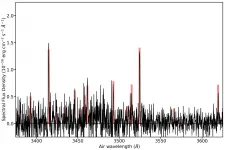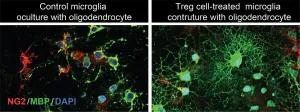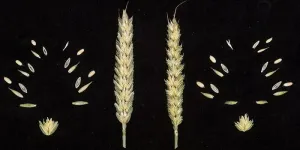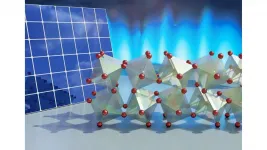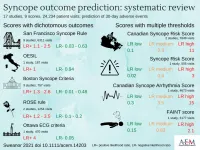(Press-News.org) A pioneering new study led by UCL scientists has revealed, for the first time, a layer of genetic material involved in controlling the production of tau; a protein which plays a critical role in serious degenerative conditions, such as Parkinson's and Alzheimer's disease.
The international research, conducted in mice and cells, also revealed this material is part of a larger family of non-coding genes* which control and regulate other similar brain proteins, such as beta-amyloid associated with Alzheimer's and alpha-synuclein implicated in Parkinson's disease and Lewy body dementia.
Researchers say the breakthrough findings, published in Nature, shed an important new light on how proteins linked to neurological conditions are produced and controlled, and could pave the way for new treatments for a wide range of dementia related diseases.
Lead author, Dr Roberto Simone (UCL Queen Square Institute of Neurology), said: "Tau plays a vital role inside our brain cells: It helps to stabilise and maintain the cytoskeletal structures that allow different materials to be transported to where they need to be. We know that too much tau is detrimental - the excess unused tau converts into toxic species that may be responsible for damaging cells and driving the spread and progression of degenerative disease. However, despite the fact that tau has been studied for more than three decades, until now we did not know how tau protein production is controlled."
For the laboratory-based study, researchers identified a section of genetic material known as 'antisense long non-coding RNA' (lncRNA). They discovered this material does not make tau directly but helps to regulate, fine-tune and repress the production of the protein inside brain cells. This precision provided by antisense lncRNA in tau regulation could be crucial for smooth functioning of the brain's nerve cells.
Research group leader, Professor Rohan de Silva (UCL Queen Square Institute of Neurology) said: "Excitingly, we found that the lncRNA that controls tau is not unique. Other key proteins we know to be involved in neurological conditions, including alpha-synuclein in Parkinson's disease and beta-amyloid in Alzheimer's disease, are controlled by very similar lncRNAs. This means we may have found the key to regulating the production of a whole range of proteins involved in brain function and the development of these devastating conditions.
"It's early days but we hope that these exciting new insights will lead to the development of drugs that can keep tau and other proteins under control, and that these therapies could be life-changing for degenerative brain conditions that as yet, have no treatments to halt, let alone slow their progression."
Other neurological conditions associated with the tau protein include corticobasal degeneration and progressive supranuclear palsy.
Targeting tau to create new treatments
Professor de Silva said: "Genetic studies have previously shown that people who have a particular form of the tau gene - called H1 - are more likely to get Parkinson's disease, corticobasal degeneration and progressive supranuclear palsy. We know that people with the H1 form of the gene produce more tau. We also know the lncRNA we've identified helps to limit tau production, and that studies using post-mortem brain tissue show this lncRNA may be reduced in people with Parkinson's disease.
"So, if we can find a way to boost the levels of this lncRNA, we might be able to reduce the production of tau protein which could help to slow or stop the damage to cells inside the brain."
He added: "That's exactly what we are working on now. Specifically, we are developing a gene therapy to deliver this lncRNA to brain cells and we're currently testing whether this approach can reduce tau levels in mice and other animal models. If it's successful, we hope to take this approach forward to be developed as a new therapy that can one day be tested in people."
Professor David Dexter, Associate Director of Research at Parkinson's UK, said: "This important research provides fantastic new insights into how tau production is controlled inside brain cells, and presents an exciting new opportunity for developing therapies that target this. It's especially exciting to see that similar mechanisms may be involved in controlling the production of many other key proteins implicated in other neurological conditions, as it suggests strategies targeting these mechanisms could be effective across many conditions."
This research has involved collaborations within UCL and with research groups at the Francis Crick Institute, UK Dementia Research Institute, St George's University of London, Karolinska Institute, Sweden and the University of Trento, Italy.
Funding for this study came from Reta Lila Weston Trust, Wellcome Trust, Medical Research Council (MRC), Parkinson's UK, CBD Solutions, PSP Association and CurePSP.
* Non-coding DNA: Our genome contains coding genes, the parts of our DNA that contain instructions for making proteins, the building blocks of our bodies. However, these coding genes make up only a small part of our genome - a mere 3% of the 3 billion letters (the nucleotides) of our genetic material. Until recently, the remainder of the genome (non-coding) was regarded as junk DNA, without known function. However, it is now clear that the DNA that lies in-between the coding genes is emerging as crucially important not only in human evolution but also in regulating function of cells and influencing the way coding genes produce proteins.
INFORMATION:
Base editing is a novel gene editing approach that can precisely change individual building blocks in a DNA sequence. By installing such a point mutation in a specific gene, an international research team led by the University of Zurich has succeeded in sustainably lowering high LDL cholesterol levels in the blood of mice and macaques. This opens up the possibility of curing patients with inherited metabolic liver diseases.
Lipoproteins are complex particles that deliver fat molecules to all tissues of the body through the blood system, supplying energy to the cells. One such lipoprotein, the low-density lipoprotein (LDL), can transport thousands of fat molecules, such as cholesterol, per particle. High levels of LDL in the blood are clinically associated with an ...
Wednesday 19 May 2021 - New research published today sheds important light on how the production of a key protein in the brain is controlled, which could pave the way for new treatments for a wide range of neurological conditions.
In a study part-funded by Parkinson's UK, researchers investigated a section of genetic material known as antisense long non-coding RNA (lncRNA), which helps fine-tune the production of the protein tau inside brain cells. This precision in tau regulation is crucial for smooth functioning of the nerve cells.
Understanding the mechanism ...
Unbound nickel atoms and other heavy elements have been observed in very hot cosmic environments, including the atmospheres of ultra-hot exoplanets and evaporating comets that ventured too close to our Sun or other stars. A new study conducted by JU researchers reveals the presence of nickel atoms in the cold gasses surrounding the interstellar comet 2I/Borisov. The team's finding is being published in Nature on 19 May 2021.
Interstellar comets and asteroids are precious to science because, unlike millions of minor bodies that formed in our Solar System, they originate from distant planetary systems. Until very recently, the existence of such cosmic vagabonds has merely ...
HOUSTON - (May 19, 2021) - A new study from researchers at Rice University has found that bodily inflammation after the death of a spouse can predict future depression.
"Inflammation and future depressive symptoms among recently bereaved spouses" will appear in the June 2021 edition of the journal Psychoneuroendocrinology. Lead author Lydia Wu, a Rice psychology graduate student, and Christopher Fagundes, associate professor of psychology and principal investigator for the Biobehavioral Mechanisms Explaining Disparities (BMED) lab at Rice, led the study. The research team evaluated 99 people who lost their spouses within 2-3 months of the study on a number of factors, including physical ...
PITTSBURGH, May 19, 2021 - Specialized immune cells that accumulate in the brain in the days and weeks after a stroke promote neural functions in mice, pointing to a potential immunotherapy that may boost recovery after the acute injury is over, University of Pittsburgh School of Medicine neurologists found.
The study, published today in the journal Immunity, demonstrated that a population of specialized immune cells, called regulatory T (Treg) cells, serve as tissue repair engineers to promote functional recovery after stroke. Boosting Treg cells using an antibody complex treatment, ...
The yeast Candida albicans can cause itchy, painful urinary tract and vaginal yeast infections. For women in low-resource settings who lack access to healthcare facilities, these infections create substantial social and economic burdens. Now, researchers reporting in ACS Omega have developed color-changing threads that turn bright pink in the presence of C. albicans. When embedded in tampons or sanitary napkins, they could allow women to quickly and discreetly self-diagnose vulvovaginal yeast infections, the researchers say.
According to the Mayo Clinic, about 75% of women will experience a yeast infection, or vulvovaginal candidiasis, at least ...
Researchers have found the elusive genetic element controlling the elongated grains and glumes of a wheat variety identified by the renowned botanist Carl Linnaeus more than 250 years ago.
The findings relating to Polish wheat, Triticum polonicum, could translate into genetic improvements and productivity in the field.
Wheat, in bread, pasta, and other forms, is a vital energy and protein source for humans. Each individual grain is nestled within the glumes and other leaf-like organs called lemma and palea which affect the grain's final size, shape, and weight.
Characterised by Linnaeus in 1762, Polish wheat has long grains, glumes, ...
The sun delivers more energy to Earth in one hour than humanity consumes over an entire year. Scientists worldwide are searching for materials that can cost-effectively and efficiently capture this carbon-free energy and convert it into electricity.
Perovskites, a class of materials with a unique crystal structure, could overtake current technology for solar energy harvesting. They are cheaper than materials used in current solar cells, and they have demonstrated remarkable photovoltaic properties -- behavior that allows them to very efficiently convert sunlight into electricity.
Revealing the nature of perovskites at the atomic scale is critical to understanding their promising capabilities. ...
Scientists, governments and corporations worldwide are racing against the clock to fight climate change, and part of the solution might be in our soil. By adding carbon from the atmosphere to depleted soil, farmers can both increase their yields and reduce emissions. A cover story in Chemical & Engineering News, the weekly newsmagazine of the American Chemical Society, explores what it would take to get this new practice off the ground.
Historically, agricultural soil has provided crops with the nutrients needed to grow, write Senior Editors Melody Bomgardner and Britt Erickson. Today, most soil is considered degraded, leading farmers to rely on fertilizer, irrigation and pesticides, all of which are costly. Scientific advancements ...
Des Plaines, IL - The Canadian Syncope Risk Score (CSRS) is an accurate validated prediction score for emergency department patients with unexplained syncope. These are the results of a study titled Multivariable risk scores for predicting short-term outcomes for emergency department patients with unexplained syncope: A systematic review, to be published in the May issue of Academic Emergency Medicine (AEM) journal, peer-reviewed journal of the Society for Academic Emergency Medicine (SAEM).
Syncope is a common presentation to an emergency department, with patients at risk of experiencing an adverse event within 30 days. Without a standardized risk stratification system of patients, there will be health care ...
